Academiashop
On this page, you find all documents, package deals, and flashcards offered by seller academiashop.
- 136
- 0
- 2
Community
- Followers
- Following
138 items

Public International Law top-rated answers for exam excellence
VCLT 26 - ANSWER-PACTA SUNT SERVANDA VCLT 27 - ANSWER-INTERNATIONAL LAW OVER DOMESTIC VCLT 8 - ANSWER-Subsequent confirmation of an act performed without authorization VCLT 18 - ANSWER-Obligation not to defeat the object and purpose of a treaty prior to its entry into force VCLT 25 - ANSWER-Provisional application VCLT 24 - ANSWER-Entry into force
- Package deal
- Exam (elaborations)
- • 2 pages •
VCLT 26 - ANSWER-PACTA SUNT SERVANDA VCLT 27 - ANSWER-INTERNATIONAL LAW OVER DOMESTIC VCLT 8 - ANSWER-Subsequent confirmation of an act performed without authorization VCLT 18 - ANSWER-Obligation not to defeat the object and purpose of a treaty prior to its entry into force VCLT 25 - ANSWER-Provisional application VCLT 24 - ANSWER-Entry into force
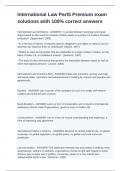
International Law Part5 Premium exam solutions with 100% correct answers
International Law Definitions - ANSWER--"IL as law between sovereign and equal states based on the common consent of these states is a product of modern Christian civilization" (Oppenheim, 1905) -"IL is the law of nations. It imposes specific obligations and rights on nations, just as domestic law imposes them on individuals" (Starke, 1947) -"Refers to rules and principles that are applicable to a large number of states, on the basis of either CIL or multilateral treaties." (...
- Package deal
- Exam (elaborations)
- • 16 pages •
International Law Definitions - ANSWER--"IL as law between sovereign and equal states based on the common consent of these states is a product of modern Christian civilization" (Oppenheim, 1905) -"IL is the law of nations. It imposes specific obligations and rights on nations, just as domestic law imposes them on individuals" (Starke, 1947) -"Refers to rules and principles that are applicable to a large number of states, on the basis of either CIL or multilateral treaties." (...
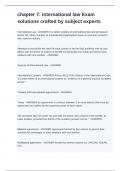
chapter 7: international law Exam solutions crafted by subject experts
International Law - ANSWER-if a nation violates an international law and persuasive tactics fail, other countries or international organizations have no recourse except to take coercive actions Attempts to reconciles the need of each country to be the final authority over its own affairs with the desire of nations to benefit economically from trade and harmonious relations with one another - ANSWER- Sources of International Law - ANSWER- International Customs - ANSWER-Article 38(1) of t...
- Package deal
- Exam (elaborations)
- • 9 pages •
International Law - ANSWER-if a nation violates an international law and persuasive tactics fail, other countries or international organizations have no recourse except to take coercive actions Attempts to reconciles the need of each country to be the final authority over its own affairs with the desire of nations to benefit economically from trade and harmonious relations with one another - ANSWER- Sources of International Law - ANSWER- International Customs - ANSWER-Article 38(1) of t...
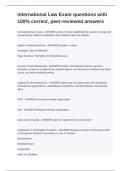
International Law Part4 Exam questions with 100% correct, peer-reviewed answers
international law as law - ANSWER-a body of rules established by custom or treaty and recognized by nations as binding in their relations with one another. origins of international law - ANSWER-empires = states Emerging "rules of behavior" Hugo Grotious: The father of International Law sources of international law - ANSWER-treaties, international customs, general principles, of law as recognized by civilized nations, the decisions of national and lower courts, and other scholarly w...
- Package deal
- Exam (elaborations)
- • 8 pages •
international law as law - ANSWER-a body of rules established by custom or treaty and recognized by nations as binding in their relations with one another. origins of international law - ANSWER-empires = states Emerging "rules of behavior" Hugo Grotious: The father of International Law sources of international law - ANSWER-treaties, international customs, general principles, of law as recognized by civilized nations, the decisions of national and lower courts, and other scholarly w...
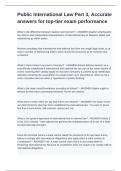
Public International Law Part 3, Accurate answers for top-tier exam performance
What is the difference between dualism and monism? - ANSWER-Dualism emphasizes the distinct and independent characteristics of international law as between states and national law as within states Monism postulates that international and national law form one single legal order, or at least a number of interlocking orders which should be presumed to be coherent and consistent What is Hans Kelsen's account of monism? - ANSWER-Kelsen defines monism as a scientifically established if inter...
- Package deal
- Exam (elaborations)
- • 2 pages •
What is the difference between dualism and monism? - ANSWER-Dualism emphasizes the distinct and independent characteristics of international law as between states and national law as within states Monism postulates that international and national law form one single legal order, or at least a number of interlocking orders which should be presumed to be coherent and consistent What is Hans Kelsen's account of monism? - ANSWER-Kelsen defines monism as a scientifically established if inter...

International Law and Global Commerce Guaranteed 100% correct answers to exam questions
International Law - ANSWER-International law has traditionally been defined in very broad terms; it is not limited simply to rules that are applied to settle disputes in court. Rather, international law is influenced by a combination of law, religious tenets, and diplomatic relations between nations. Modern International Law - ANSWER-a body of rules and principles of action binding on countries, international organizations, and individuals in their relations with one another. Public intern...
- Package deal
- Exam (elaborations)
- • 9 pages •
International Law - ANSWER-International law has traditionally been defined in very broad terms; it is not limited simply to rules that are applied to settle disputes in court. Rather, international law is influenced by a combination of law, religious tenets, and diplomatic relations between nations. Modern International Law - ANSWER-a body of rules and principles of action binding on countries, international organizations, and individuals in their relations with one another. Public intern...

International Law Part 1 Fully accurate exam questions with step-by-step solutions
How many nation states are involved in the horizontal structure of international law? - ANSWER-193 Why is there universal adherence in international law? - ANSWER-Fear of sanctions, same motivation as to why we adhere to traffic regulations, mutual well-being of members of society International Law Definition - ANSWER-International law is that body of rules or norms that are considered legally binding by states in their intercourse with each other. Horizontal System of International Law...
- Package deal
- Exam (elaborations)
- • 6 pages •
How many nation states are involved in the horizontal structure of international law? - ANSWER-193 Why is there universal adherence in international law? - ANSWER-Fear of sanctions, same motivation as to why we adhere to traffic regulations, mutual well-being of members of society International Law Definition - ANSWER-International law is that body of rules or norms that are considered legally binding by states in their intercourse with each other. Horizontal System of International Law...
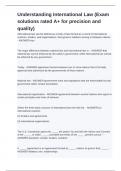
Understanding International Law (Exam solutions rated A+ for precision and quality)
International law can be defined as a body of law formed as a result of international customs, treaties, and organizations, that governs relations among or between nations. - ANSWER-true The major difference between national law and international law is: - ANSWER-that national law can be enforced by the nation's government, while international law cannot be enforced by any government Treaty - ANSWER-agreement formed between two or more nations that is formally approved and authorized by...
- Package deal
- Exam (elaborations)
- • 3 pages •
International law can be defined as a body of law formed as a result of international customs, treaties, and organizations, that governs relations among or between nations. - ANSWER-true The major difference between national law and international law is: - ANSWER-that national law can be enforced by the nation's government, while international law cannot be enforced by any government Treaty - ANSWER-agreement formed between two or more nations that is formally approved and authorized by...

Fundamentals of International Law Accurate exam solutions for A+ grades
1 Which part of international law deals with relations between sovereign states? A Relational law B Private law C Sovereign law D Public law - ANSWER-D Public law 2 In the statement, "The effectiveness of diplomacy depends upon the power of the state," what type of power is being referred to? (Input all that apply, then push the ENTER button.) A transportation B electric C military D economic - ANSWER-C military D economic 3 Where is the International Court of Justice l...
- Package deal
- Exam (elaborations)
- • 6 pages •
1 Which part of international law deals with relations between sovereign states? A Relational law B Private law C Sovereign law D Public law - ANSWER-D Public law 2 In the statement, "The effectiveness of diplomacy depends upon the power of the state," what type of power is being referred to? (Input all that apply, then push the ENTER button.) A transportation B electric C military D economic - ANSWER-C military D economic 3 Where is the International Court of Justice l...
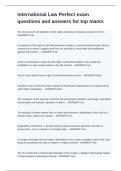
International Law Perfect exam questions and answers for top marks
The most recent UN definition of the rights and duties of states occurred in 1974. - ANSWER-True Acceptance of the right to self-determination remains a controversial principle without consent as to whom it applies and how the principle is reconciled with prohibition against intervention. - ANSWER-True Some commentators argue that the right to self-determination may violate the prohibition on intervention stated in the UN Charter - ANSWER-True The ICJ has stated that no right of self-de...
- Package deal
- Exam (elaborations)
- • 16 pages •
The most recent UN definition of the rights and duties of states occurred in 1974. - ANSWER-True Acceptance of the right to self-determination remains a controversial principle without consent as to whom it applies and how the principle is reconciled with prohibition against intervention. - ANSWER-True Some commentators argue that the right to self-determination may violate the prohibition on intervention stated in the UN Charter - ANSWER-True The ICJ has stated that no right of self-de...
